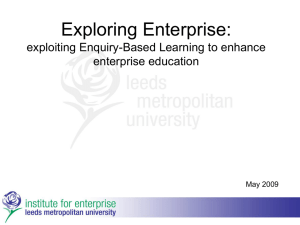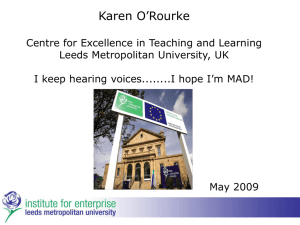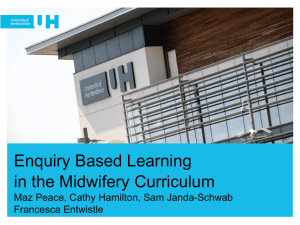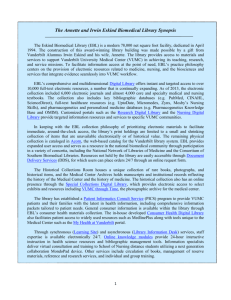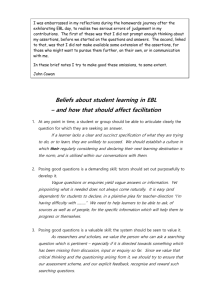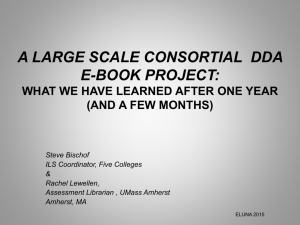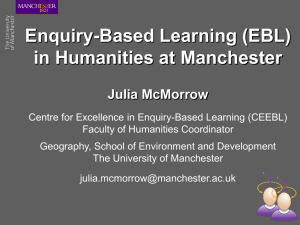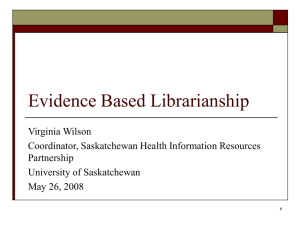Enquiry-Based Learning in Languages Manchester
advertisement
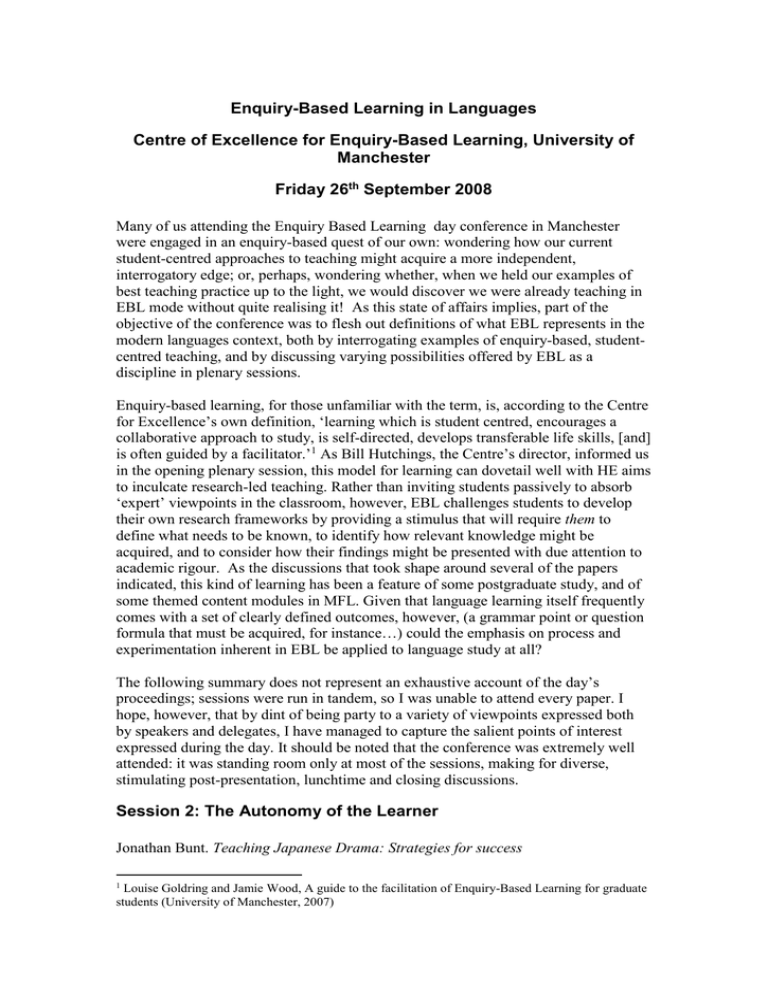
Enquiry-Based Learning in Languages Centre of Excellence for Enquiry-Based Learning, University of Manchester Friday 26th September 2008 Many of us attending the Enquiry Based Learning day conference in Manchester were engaged in an enquiry-based quest of our own: wondering how our current student-centred approaches to teaching might acquire a more independent, interrogatory edge; or, perhaps, wondering whether, when we held our examples of best teaching practice up to the light, we would discover we were already teaching in EBL mode without quite realising it! As this state of affairs implies, part of the objective of the conference was to flesh out definitions of what EBL represents in the modern languages context, both by interrogating examples of enquiry-based, studentcentred teaching, and by discussing varying possibilities offered by EBL as a discipline in plenary sessions. Enquiry-based learning, for those unfamiliar with the term, is, according to the Centre for Excellence’s own definition, ‘learning which is student centred, encourages a collaborative approach to study, is self-directed, develops transferable life skills, [and] is often guided by a facilitator.’1 As Bill Hutchings, the Centre’s director, informed us in the opening plenary session, this model for learning can dovetail well with HE aims to inculcate research-led teaching. Rather than inviting students passively to absorb ‘expert’ viewpoints in the classroom, however, EBL challenges students to develop their own research frameworks by providing a stimulus that will require them to define what needs to be known, to identify how relevant knowledge might be acquired, and to consider how their findings might be presented with due attention to academic rigour. As the discussions that took shape around several of the papers indicated, this kind of learning has been a feature of some postgraduate study, and of some themed content modules in MFL. Given that language learning itself frequently comes with a set of clearly defined outcomes, however, (a grammar point or question formula that must be acquired, for instance…) could the emphasis on process and experimentation inherent in EBL be applied to language study at all? The following summary does not represent an exhaustive account of the day’s proceedings; sessions were run in tandem, so I was unable to attend every paper. I hope, however, that by dint of being party to a variety of viewpoints expressed both by speakers and delegates, I have managed to capture the salient points of interest expressed during the day. It should be noted that the conference was extremely well attended: it was standing room only at most of the sessions, making for diverse, stimulating post-presentation, lunchtime and closing discussions. Session 2: The Autonomy of the Learner Jonathan Bunt. Teaching Japanese Drama: Strategies for success 1 Louise Goldring and Jamie Wood, A guide to the facilitation of Enquiry-Based Learning for graduate students (University of Manchester, 2007) Jonathan Bunt was the first of many speakers to demonstrate the potential for electronic resources to enhance autonomy and stimulate original thinking amongst students. He used popular Japanese television drama (‘dorama’: an equivalent to soap opera) to stimulate students to reflect upon both grammatical and cultural Japanese constructs. Using high-quality transmissions along with target language transcripts of subtitles designed for hearing-impaired watchers (both available via the web), students were first invited to engage in a number of teacher-led activities (filling in gaps, identifying particular grammatical constructs, transcribing small excerpts of material, observing body language). Groups of students were then supplied with CDs containing other extracts from the same drama, and invited to use this material creatively as the basis of a seminar presentation intended to reinforce linguistic skills and build up cultural knowledge. In practice, Bunt noted that students frequently followed his model when working with these recordings, though they were under no obligation to do so. The pedagogical benefits of using such material were many: ‘dorama’ is a very popular medium amongst undergraduate students, so they have an immediate investment in perfecting their understanding of linguistic and cultural concepts associated with it, as well as a ready-made context into which the activities can be slotted. The tasks created by Jonathan married clearly definable outcomes (targeted cloze tests, dictionary work and so forth) with open-ended aims, such that learning was perceived by the group as a shared process rather than a teacher-led one. The up-to-the-minute nature of the module increased the feeling of spontaneity and shared enquiry; by Jonathan’s own admission, inculcating such a sense of immediacy required a vast amount of regular preparatory work on the tutor’s part. Jonathan thus highlighted the fact that the development of creative teaching programmes and their execution comes with price tags of various sorts: the cost is in time, commitment and departmental / faculty support (this module was conceived independently from existing Japanese language modules, for instance). Marco Valleriani ‘Working by hypotheses’ and Independent Learning in Languages Marco’s paper provided a very useful theoretical discussion of the role of enquiry in the learning process, and sought to explore the ways in which language learners, even ab initio learners, might tap into this mode of learning. Marco stressed the need to determine different learning styles in order best to exploit students’ spirit of enquiry, suggesting that Blum’s taxonomy be used to measure the variety of approaches likely to emerge in a class. His paper concluded on a highly imaginative note with a demonstration of ways in which photographs could be used to inspire novice students to use the subjunctive and verbs of reflection. The photos, taken from the National Geographic website, were so intriguing as to invite immediate speculation amongst the delegates, as they had clearly been intended to do amongst students. It was an excellent demonstration of how an abstract visual stimulus, triggering existential questioning, could lead students to grasp the need for a second language model (here one based on hypothesis) in order to respond to this way of knowing the world. Session 3: EBL and Portfolios Christine O’Leary The role of portfolios in an Enquiry-Based Approach to Learning, Teaching and Assessment. Christine led into her session by addressing a question raised by Phil Benson in a forthcoming work: that of whether autonomy in learning ought to be assessed. Defining learner autonomy as that which hands to students an element of control over their working environment, the content of their learning, and the cognitive processes involved, Christine took us through a portfolio-based language module constructed with these aims in mind, and currently in place at Sheffield Hallam. The linguistic objectives of the module were, broadly speaking, the honing of translation and interpreting skills; alongside these linguistic objectives sat a number of metacognitive ones: the module sought to engage the students in self and peer assessment around both individual and group-oriented tasks. The portfolio included a group translation task, an interpretation task, a piece of reflective writing and a time-constrained language activity. In the case of the translation activity, students were required to define their learning needs, develop their own schedule of work, establish their assessment goals and learn how to give and receive feedback. Christine drew our attention particularly to students’ concern with the affective dimension of these activities (to which they testified in their reflective writing). Passing judgement on others’ work and proving themselves effective members of a team were issues that prompted mature reflection, and there seemed little doubt that this explicit focus had generated a heightened awareness of strategies for successful independent learning. Questions from the floor centred upon the thorny issue of assessing autonomy that Christine had opened with: to what extent should one assess the processes at work in this activity and to what extent the product (in this case the finished translation) that emerged from it? Christine revealed that the module stood apart from other language modules run in her department, allowing her to privilege enquiry-based skills alongside linguistic ones, and that she had experimented with different weightings for the reflective writing and language-centred elements. Theresa Oliver Integrating Linguacultural Knowledge through EBL projects. Theresa’s paper, and the modules around which it was based, complemented Christine’s perfectly in its demonstration of the possibilities for marrying process assessment with product assessment in the language classroom. Focussing upon two Italian language modules: one designed for ab initio students and the other for second-year students, Theresa gave a practical lead on inculcating an enquiry-based approach from the earliest of stages in the language-learning process. A scenariobased project was built into a work programme for ab initio learners that also focussed upon more traditional writing and reading skills. These students were given the task of updating aspects of an Italian tourist board website. They were responsible for every aspect of the authorship of their task: determining its readership, identifying an appropriate register, and proof reading the material they produced. Project-based lessons were scheduled into the overall programme and took place every few weeks. Students produced drafts at regular intervals, and were encouraged to refine their work with the help of a very detailed self checking list and some teacher-led oversight that identified action points that the students would take forward outside of the classroom in the periods between sessions. Where linguistic problems were identified, students were enjoined to create their own worksheets to tackle these. The paper, and particularly the self-checking list designed to keep students actively involved in the assessment and modification of their own work generated particular interest amongst delegates. Session 6: EBL and Peer-Assisted Study Annie Morton EBL Peer Grammar Revision Project Annie’s session was splendidly constructed around the conceit of a marriage: that of Enquiry Based Learning and Peer Assisted Learning, a union recently put to the test amongst final-year and first-year students of French grammar at Manchester University. The teaching team here devised a highly imaginative way of revising key grammatical concepts by creating scenarios that prompted students to identify and analyse targeted grammar problems (via error spotting, glossing of highlighted extracts of French textual material and so forth). This fairly standard task-based activity was then given an enquiry-based twist in two ways. The problem solvers (first-year students) were asked to become teachers, devising ways of explaining the rules and anomalies encountered to fellow language learners, and identifying or inventing material that would allow those rules to be further practised and clarified (such as drawing up bibliographies of appropriate reading matter on the topic, for instance). This peer learning model was then fed through a further peer teaching / learning prism: the scenario-based activity was designed to take place outside of the classroom, and to be facilitated by final-year French students. The latter had to research the grammar points relating to the scenarios given in order to deal with the first-years’ questions and to assess their responses. The activity brought clear benefits to all parties, who were required to draw on cognitive and transferable skills to ensure its success. Once up and running, teaching staff were able to remain at a distance from the teaching and learning processes generated by discrete grammar points, but were able to encourage reflection upon the strategies needed to engage in these amongst participating students. The project is set to continue, with final-year participants being further encouraged to develop grammar-learning scenarios of their own. Elena Polisca From Student to Student: a Mentoring Approach to Facilitate (Language) Learning Elena’s presentation was rich in ideas for using electronic media to enable individual and group reflection and interactivity amongst Polish learners, even at beginner’s level. In particular, Elena showed how these media could remove some of the artificiality that can characterise rudimentary language exercises. She was the second of the speakers to make use of the soap opera genre, which offered a familiar thematic and emotional landscape and clear visual cues to stimulate responses from new(ish) learners. As their writing skills progressed, her students composed emails, firstly to imaginary recipients, and then to a real Polish writer who engaged in a freer e- dialogue with them. Statistical information about Polish culture available on the web was used to stimulate number-based activities; aural, oral, writing and research skills were exploited later in the module when students were required to transcribe a political speech and asked to identify the speaker (using Google to search key phrases). The discussion that followed the presentation broached the question of distinction between task-based and enquiry-based learning: how much freedom is it desirable to give to beginner linguists, and is their approach to open-ended tasks likely to model closely the teacher-led activities that they have previously witnessed in a way that must constrain a true spirit of enquiry? Session 7 (Plenary): EBL and Employability Graham Webb Demonstrating Language Graduates’ Employability Graham’s presentation showcased a well-established module currently running at Leeds Metropolitan University that has a proven track record of success. It was conceived in order to allow final-year linguists to acquire marketing and other business skills within international companies that were in turn able to reap benefits from their language knowledge. Graham established links with a number of local companies that had European connections – a process that required a considerable amount of ground work on his part – and persuaded them to set his students live research projects born of real corporate needs. In fulfilling their briefs, students were required to define aims and outcomes, problem solve, present data with due attention to accuracy and demonstrate time management, communication and teamwork skills in large doses. A series of video interviews with directors who had worked with the students testified to the high quality and practical applicability of the information they received from the student participants. Students were assessed by means of a presentation made to a panel consisting of company representatives and academic staff, and by the production of a written report. Graham was at pains to stress that the module itself did not directly assess language knowledge; rather, the enquiry-based activities that led to the oral and written outcomes submitted relied, amongst other things, upon a range of language-specific cognitive skills. Catherine Franc Languages and Employability Together with Graham, Catherine reflected upon the desirable work-place skills that an enquiry-based approach to language learning can foster in students. Strengths in the area of communication are, of course, a huge asset in the workplace and one that employers hope to find in our linguists (these must continue to be nurtured: Catherine cited a very recent broadsheet article lamenting the generally-weak linguistic skills of British graduates). Increasingly, however, employers cite the desirability of ‘soft skills’ alongside subject-specific qualifications. EBL, Catherine argued, acts as a tool that enables students to ‘make the shift from cognitive to social ways of learning’ that are predicated upon soft, transferable skills. Moreover, students who have an eye to the world of work even in non-vocational learning contexts seem increasingly motivated by forms of learning that marry academic rigour with clear, practical stimuli to the conceptualising of objectives, the plotting of intellectual pathways, the management of information and so forth. By way of example, Catherine presented a selection of scenarios taken from a phonetics EBL project she had developed for undergraduate students of French at Manchester. These included subject-specific problem-solving activities; prompts intended to encourage the management of time, information and people; and assessments requiring the creative manipulation of a cognitive ‘product’ (that of accurate phonetics knowledge). This framework, redolent of those set out in several other modules presented in the course of the day, pointed to a desire shared by many teachers present to synthesize particular subject-specific outcomes and inventive learning processes in a format that could be accurately assessed. Once again, as the presentations drew to a close, the tensions involved in the measuring of ‘soft’ skills and concrete cognitive outcomes came to the fore. The Table Ronde It had become clear, at this point in the knowledge-sharing process, that the conference needed a precise working definition of EBL that could distinguish it from task-based / problem based learning practices that have long been used in language teaching and for which there exists an extensive research base. It was suggested by the meeting that EBL privileges learner autonomy to a greater extent than TBL / PBL in the following ways: It generates meaning-based scenario tasks that require students (rather than teachers) to establish the parameters of a problem or situation. Students must define aims and outcomes in respect of the scenario, which they must then act upon and interpret for themselves. It places greater emphasis upon learning processes than upon learning products. These processes may privilege the affective dimensions of the learning experience. These criteria gave rise to further questions that had began to emerge through the examination of current practice in several of the sessions that I attended : What role should the tutor play in EBL? Do the cognitive processes that are a feature of language learning give rise to a particular form of EBL that can be firmly distinguished from its application in area studies or literary studies? Is the desire to assess process (or ‘soft skills’) present in EBL inadequate, in the final analysis, for a discipline that holds that written, oral and aural linguistic accuracy is fundamental to effective communication? How can EBL practitioners effectively deal with errors? Would the introduction of EBL conflict with other modes of learning deemed necessary in the formation of a language graduate? These were addressed in the following ways It was noted that EBL is not intended to replace other forms of learning that may be more teacher centred, but to complement these. Many practitioners thought it possible – if not essential – to circumscribe a space for EBL, where EBL could enable open-ended, research-led reflection upon cognitive concepts taught elsewhere. As can be seen from the papers summarized above, many of the most radical EBL language-learning initiatives presented were made possible where departments had allowed for the creation of separate, inventive modules and were willing to allow these to be assessed in less orthodox fashion. The conference closed on an up-beat note, acknowledging both the enthusiasm expressed by delegates for learner-centred, autonomous teaching and learning practices, and the amount of good practice already available to be shared amongst the HE language-learning community. It was felt important that the LLAS subject-centre capitalise on this in a number of ways, by supporting a community of interested parties through the creation of an EBL JISC email list; organising workshops that will allow the real potential of EBL to be explored by language teachers; seeking to establish a rigorous academic basis for EBL in languages through peer-reviewed work. Further Reading Some speakers cited secondary sources that had particularly inspired their conception of EBL in MFL. Baume, D and Baume, C, Learning to Teach: Running Seminars and Tutorials (Oxford, 1996) Richards, Jack C and Willy Renandya (eds), Methodology in Language Teaching (Cambridge, 2002) White, R and Arndt, V, Process Writing (London, 1991)
